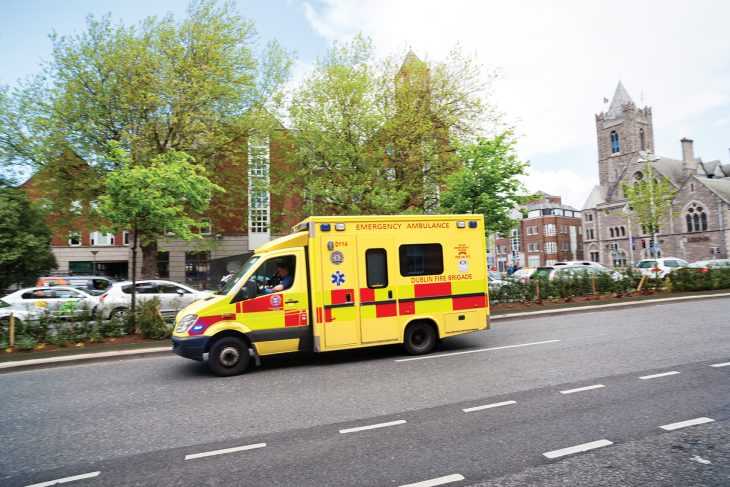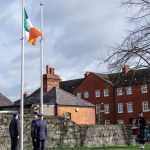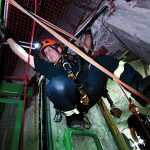The DFB is providing its usual excellent service in a very unusual time, writes Adam Hyland.
The citizens of our city know how hard the Dublin Fire Brigade is working to keep us safe at this unprecedented time. The Covid-19 pandemic has presented significant challenges to the DFB, and at the time of writing the situation is constantly evolving, but what has remained the same is the commitment of the frontline personnel who are working to keep the general population safe, and the sharing of important information that has helped us help them in this endeavour.
While social distancing and restrictions on movement have resulted in fewer vehicles on our roads, the DFB has over the last few months had to respond to a large number of “everyday” call outs on top of the huge number of Corona virus-related cases.
At the end of March, with restrictions on movement in place, Station Officer Darren O’Connor spoke on Sean O’Rourke’s Today Show on RTÉ Radio One about the demands placed on the DFB when they are already stretched to capacity.
He also outlined to the public the ways in which the DFB is dealing with the situation at station level, providing much-needed reassurance. “Where normally crews would meet in the station at changeover, that has changed. The outgoing crew are segregated from the incoming crew so that there is no cross-contamination. We have an increased level of cleaning around the stations too,” S/O O’Connor explained.
“In terms of PPE, we have a logistics section that has set up a distribution centre to send out gear as and when it is needed. Crews are out there dealing with confirmed and suspected cases every day, so the workload for every crew is substantial.
“Our supply lines are critical. In terms of usage, it is very intensive because we are transporting suspected and confirmed cases, using two pairs of gloves, face shields, visors, goggles, aprons, and then cleaning solutions for the decontamination of the ambulances after contact with a case.”
INFORMATION
S/O O’Connor also pointed out the great work being done to share information via the DFB’s social media platforms, which outlines not just the work being done, but also amplifies the message about the importance of the public staying at home.
This has included messages about hand hygiene and coughing etiquette, vital contact numbers, and advice on how to trace back contacts should a member of the public fall ill.
This message was backed up a few days later when Firefighter/Advanced Paramedic Eithne Scully appeared on The Late Late Show to emphasise the hard work being done by the DFB and the need for the public to follow Government guidelines.
As the lockdown continued, Firefighter/Advanced Paramedic Stephen Williams was on Newstalk’s Alive & Kicking show to again discuss the challenges facing frontline staff during the Covid-19 crisis, and to outline how the DFB responds to cases using the safest possible protocols.
“Work has changed dramatically for all of our personnel in a very short space of time,” FF/P Williams said. “We have to adjust our work practices both at the station and on the road, with social distancing in place. New patient assessments and decontamination procedures are in place for ambulances, and each case can be more time-consuming than normal, which puts pressure on an exceptionally busy service.”
CHALLENGES
Regarding the challenges of the pandemic, FF/P Williams said: “It’s difficult because of the frequency of the situation. We are used to crisis situations, but ordinarily we would have time between each one to digest it and refocus for the next one, but these are coming more frequently so there is very little down-time and we have to pull ourselves back together very quickly.
“The first challenge I noticed when we started responding to these cases was the increased levels of anxiety people are experiencing. Thankfully, the majority of people have had mild symptoms and reassurance and healthcare advice puts them at ease.
“The second challenge is trying to figure out and assess whether the patient has Covid-19 or if it could be something else such as a heart attack, or both. But the most difficult challenge in the tasks we are undertaking is ventilating patients – with our goal to keep the ventilation circuit as closed as possible, using a tight mask seal, advanced airways and viral filters, so it’s made a complex situation far more challenging, from making a working diagnosis to the PPE we have to wear and the treatment we provide.”
This information was another valuable aid for the public in understanding what the emergency services are experiencing, and to remind us that DFB members are risking their lives to save others (something which has been backed up by the Ireland On Call series on RTÉ every Tuesday and Thursday, featuring FF/Ps going about their increasingly busy work).
SAVING LIVES
“I don’t think there is anyone in the country who hasn’t been affected in some way by the virus and we are no different,” FF/P Williams said. “A number of our colleagues have tested positive, but we are happy to say they have all recovered. This highlights the effects the virus is having on healthcare workers across the world. It really brings it home just how serious this can be.
“That being said, our firefighters and paramedics are a resilient and very professional group who are rising to the challenge of tackling the virus. Everyone is pulling together to support each other.
“We have been given additional ambulance capacity, our logistics department is working around the clock to get much-needed supplies to the crews, and we have daily communication bulletins keeping us up to date with the latest information because things can change daily, sometimes hourly.
“We also discuss cases with each other in order to gain a better understanding of what interventions are working, or if a particular procedure needs to be improved.”
CLARITY
With that positive message came another important one regarding the role of the DFB during the crisis. “Due to the constantly evolving nature of the crisis, there is some confusion as to what our ambulances can and cannot do, so it is good to clarify that,” FF/P Williams said. “We provide an emergency fire and ambulance service to the people of Dublin, so people should only ring 999 or 112 in an emergency. We cannot provide advice on Covid-19 or arrange for testing. This is done through your GP or by phoning the HSE hotline. Going to hospital is not a fast-track to being tested either, so let’s keep our ambulances for those that need them.”
Speaking to the Irish Times in mid-April, Chief Fire Officer Dennis Keeley outlined the challenges currently being faced, saying that up to 10% of DFB staff are unavailable for
duty due to COVID-19 illness or isolation measures.
“We have 11 people who have tested positive and 85 currently in self-isolation,” he told the newspaper. “It’s a fluid situation, because some of those who tested positive have recovered and are back in work, but we’re down about 8-10% of our staff.”
He emphasised that the DFB is still at “full operating capacity” due to staff depletion measures and some retired firefighters returning to service.
The second call centre established at the OBI has also helped in separating calls related to the virus from other emergency calls, and to allow staff to maintain greater distancing.
“I am very proud of the work Dublin Fire Brigade is carrying out, both our own firefighter paramedics and those responding to the 999 and 112 calls. It’s very challenging and everyone is working flat out,” CFO Keeley said.
There is far more work being done by the DFB at the moment than the public will ever know, but the sharing of information regarding how frontline personnel are handling the situation has been gratefully accepted. When normality resumes, I hope to cover these steps in more detail, but for now, all I can say is a huge thank you to the Dublin Fire Brigade on behalf of the public you serve so well.





